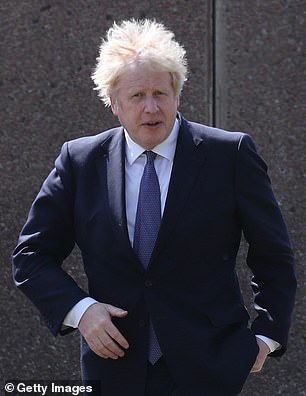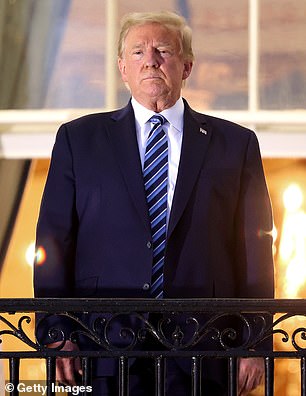
Professor Professor Rodney Jones, a linguistics expert at Reading University, found the UK and US leaders used their Covid illnesses to portray themselves as ‘strong leaders’ and draw attention from their ‘failures’ during the pandemic
Boris Johnson and Donald Trump used their bouts with Covid to portray themselves as ‘strong leaders’, an academic has claimed.
The Prime Minister tested positive for coronavirus just days after he plunged Britain into its first lockdown last March.
He spent six nights in hospital and was admitted to intensive care, forcing doctors to make contingency plans in case he died.
Meanwhile, former US President Donald Trump tested positive in October and had a three-day stint fighting the disease in hospital.
Professor Rodney Jones, a linguistics expert at Reading University, said both created a narrative to ‘promote a masculinist discourse’ centred around messages of ‘strength’, ‘swagger’ and ‘courage’.
This subtext was ‘designed to depict them as ‘strong leaders”, he wrote in the journal Discourse, Context and Media.
It also was used to ‘detract attention from their reckless personal behaviour leading up to their infections and the failures of their government to formulate coherent plans to control the pandemic’.


Boris Johnson (left) and Donald Trump (right) shared a message that defeating Covid was about ‘strength’ and ‘courage’ rather than ‘sensible public health measures’, a study found. Professor Rodney Jones (inset), a linguistics expert at Reading University, said both created narrative to ‘promote a masculinist discourse’
Johnson and Trump’s ‘hyper-masculine’ language affected their response to Covid pandemic, study says
Boris Johnson and Donald Trump used masculine language to emphasise their strength and courage in overcoming Covid, a linguistics expert at Reading University said.
Professor Rodney Jones found their ‘hyper-masculine’ language impacted their response to the pandemic.
For example, Mr Johnson’s suggesting that the UK should ‘take it on the chin’ and Mr Trump ‘undermining the efforts of (particularly female) state governors to control the pandemic’, he said.
Speaking about his illness, Prime Minister Boris Johnson told the Sun on Sunday: ‘The bloody indicators kept going in the wrong direction and I thought, ‘There’s no medicine for this thing and there’s no cure […] That was the stage when I was thinking, “How am I going to get out of this?’”
Professor Jones said the Prime Minister’s language transformed ‘his illness narrative into a story of the heroic deeds of the doctors and nurses who care for him and of the bravery and resilience of Johnson himself’.
Meanwhile, Donald Trump told a radio interview: ‘How bad was I?’: They said, ‘You could have been very bad. You were going into a very bad phase.’ And so it wasn’t like it was just going to, like with the kids where they get it and it get sniffles and they’re better two days later, right? This looks like it was going to be a big deal. And you know what that means, right? That means bad.’
The former president’s account enhanced his status as someone who overcame the virus, Professor Jones added.
He said some scholars have noted that ‘toxic masculinity’ more generally contributed to the spread of the virus as well as to the spread of disinformation about it.
Advertisement
Professor Jones trawled through all the public statements, social media posts and interviews the leaders made about their experience getting infected, being treated and recovering.
The main differences in their communications was Mr Trump talked about his illness ‘much more’ than Mr Johnson, who seemed to be practising ‘social distancing’ with reporters and the public, he said.
In the month when Mr Johnson was unwell, he sent out 26 tweets, 16 of which were about Covid and eight about his own illness.
He also spoke publicly just once about his illness — at a Covid briefing on April 30 — and once in an interview with the Sun on Sunday.
Meanwhile, Mr Trump — a prolific tweeter at the time — sent out 1,424 tweets in the month around his illness, 83 of which were about Covid and 27 about being unwell.
He spoke about his illness at three campaign rallies and in three media interviews.
Professor Jones found that both leaders were sharing ‘essentially the same’ message that ‘defeating’ the virus was a matter of ‘strength’, ‘courage’ and innovation, rather than ‘sensible public health measures or evidence-based government policies’.
‘Masculinity was a central theme in the illness narratives of the two leaders, with each endeavouring to portray themselves as strong, resilient leaders whose illnesses made them even more qualified to lead,’ he said.
Mr Johnson said he got better due to the ‘courage’, ‘devotion’ and ‘love’ or ‘brilliant’ doctors, while Mr Trump credited ‘miraculous’ drugs and ‘amazing’ doctors.
The leaders referenced their strength, with the Prime Minister saying in an interview that his ‘terrible buoyancy’ helped him get better.
And the former US President said at a rally his ‘youth’ and ‘good health’ helped him pull through.
Framing disease in this ‘masculinist’ way can harm public health by implying that those who do no survive ‘lack fortitude’, Professor Jones said.
It also ignores the importance of adequately funding health services, he added.
The language the leaders used also impacts governance because it makes it difficult for them to hand over power to others when unwell, the study claimed.
Both leaders used ‘business as usual language’ when revealing their positive Covid tests that downplayed the importance of the announcement.
This included Mr Johnson using the phrase ‘I want to bring you up to speed’ in a video on Twitter revealing he had Covid and Mr Trump using direct language in his tweet.
Both leaders put on ‘regular displays’ of ‘working’ and remaining ‘in charge’, in line with traditional concepts of masculinity in which men’s social worth is defined by work’, Professor Jones said.
For example, after testing positive, Mr Johnson shared a video saying he was continuing to ‘lead the national fightback against coronavirus’ and tweeted a video of him chairing a Zoom meeting.
Meanwhile, Mr Trump and his ‘spokespeople’ shared videos showing him working throughout his illness, including a tweet saying ‘nothing can stop him working for the American people’.
They also used a narrative of ‘masculine swagger’ which was ‘counterproductive as a public health message’, Professor Jones said.
The Prime Minister did this by using understatement when speaking, such as saying he felt ‘pretty groggy’ or that he was not in ‘particularly brilliant shape’, he found.
Meanwhile, the former US President through over overstatement by emphasising his ‘perfect’ condition, the ‘miraculous’ drugs he took and describing the hospital as ‘incredible’ and ‘amazing’, Professor Jones added.
Source link : https://www.dailymail.co.uk/news/article-9883359/Boris-Johnson-used-Covid-illness-portray-strong-leader-study-claims.html











